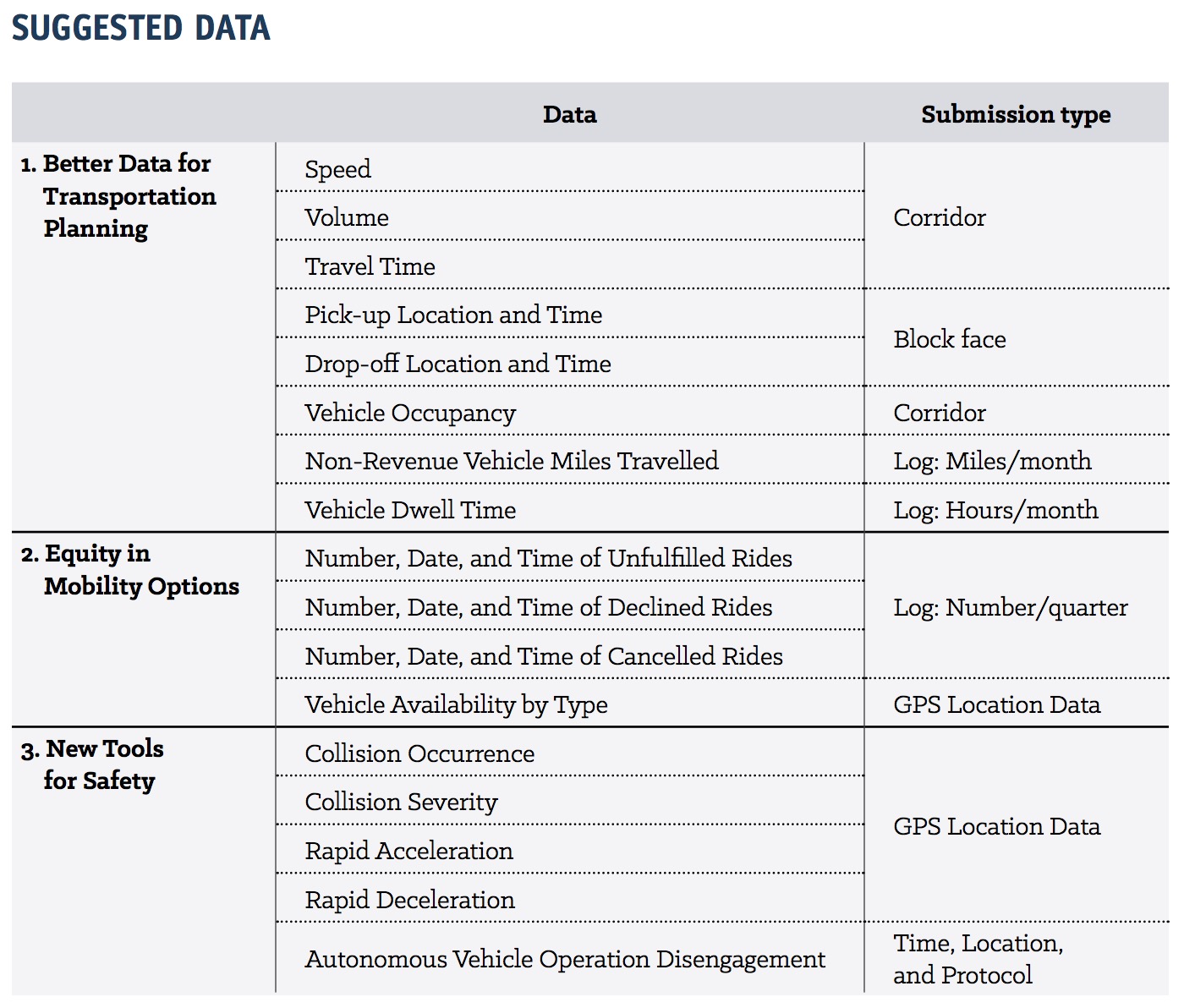NATIONAL ASSOCIATION OF CITY TRANSPORTATION OFFICIALS (NACTO)
Vision Statement
Data is the foundation of 21st century transportation systems. As new transportation technologies rapidly emerge they create data streams with vital information for management, proactive planning, and policymaking. These data created on city streets must be available to cities in an accessible format in order to support sustainable, accessible, and affordable transportation.
NACTO’s data sharing standards aim to facilitate better working relationships between cities and private transportation providers by elevating and standardizing the process of data sharing. These will enable more proactive, data-driven transportation planning solutions and allow private mobility providers to exchange data with cities in the most secure, cost effective, and efficient manner possible.
NACTO’s data sharing standards set a path forward for:
1. Better Data for Transportation Planning
2. Inclusion in Mobility Options
3. Better Tools for Safety
1. Better Data for Transportation Planning
Cities seek the best data to understand, manage, and maintain increasingly constrained transportation networks. This data comes from real time information about operations on city streets. New mobility providers and other GPS- or AVL-enabled fleets collect information that can provide unique insights to cities on the operation of their streets. Sharing of this data in an accessible, secure, and interoperable manner will allow cities to manage, maintain, and proactively plan based on accurate data. The following information should be available to cities from all mobility providers and fleets operating on city streets.
- Manage City Streets: Corridor level trip routing information including speed, travel time, and volume data is essential for better street management.
- Manage Curb Space: Curb space has become increasingly desirable among mobility providers in cities. Provision of information on pick-up and drop-off locations allows cities to properly allocate and dynamically manage curb space to prevent congestion and ensure safe operations on city streets.
- Prioritize Moving People: As urban populations grow, cities streets must move more people in the same amount of space without increasing congestion. In order to provide efficient transportation for the greatest number of urban dwellers, data to prioritize the movement of vehicles with higher occupancy is necessary. This includes data on vehicle occupancy, non-revenue VMT, as well as vehicle dwell times.
2. Inclusion in Mobility Options
Our cities should provide mobility for all residents, regardless of incomes, ages, and abilities. While new mobility options have the potential to expand services beyond those that cities currently provide, it is essential they do so while maintaining equity and accessibility.
- Equitable Provision of Mobility Services: Maintaining a record of denied, declined, or cancelled ride—as well as availability and demand for vehicles, and wheelchair accessible vehicles (WAV) in particular—by location allows cities to observe trends over time and expend city resources where needed.
3. Better Tools for Safety
Data can provide essential insight for the understanding and prevention of collisions in cities. As cities seek to use every tool at their disposal to prevent the loss of life on streets, new approaches to collecting and analyzing data are required. New mobility providers collect driver behavior information that provides insight essential for proactive safety decisions to achieve Vision Zero goals. Additionally, information regarding autonomous vehicle operation disengagement (when vehicle operation shifts to human driver) is pertinent to safe city streets for all users.
- Identification of Design Issues: Trends in incidents of rapid acceleration and deceleration, autonomous operation disengagement, as well as collision occurrence and severity help to identify street design issues that, if corrected, can make urban streets safer for all users.
Next Steps
Near Term: NACTO and Data Sharing Standards supporters will work together toward the use of the World Bank’s Open Traffic to streamline and standardize data for all NACTO cities. This will include transit vehicles with Automatic Vehicle Location (AVL) systems and GPS location data from other new mobility providers.
Long Term: In an effort to enable more proactive, data-driven transportation planning and policy, NACTO will work with its member cities and private mobility providers towards secure and standardized exchange of anonymized data essential for better transportation planning, equity in mobility options, and new tools for safety.
Open Traffic is a global repository that translates vehicle GPS data into anonymous historical and real-time travel information and travel statistics. This platform provides an API and visual map-based interface for querying data essential to understanding, managing and planning for better streets.
Download full version (PDF): City Data Sharing Principles
About the National Association of City Transportation Officials (NACTO)
nacto.org
The National Association of City Transportation Officials (NACTO) is a 501(c)(3) non-profit association that represents large cities on transportation issues of local, regional and national significance. NACTO views the transportation departments of major cities as effective and necessary partners in regional and national transportation efforts, promoting their interests in federal decision-making. We facilitate the exchange of transportation ideas, insights and best practices among large cities, while fostering a cooperative approach to key issues facing cities and metropolitan areas. As a coalition of city transportation departments, NACTO is committed to raising the state of the practice for street design and transportation by building a common vision, sharing data, peer-to-peer exchange in workshops and conferences, and regular communication among member cities. We believe that by working together, cities can save time and money, while more effectively achieving their policy goals and objectives.
Tags: Data, NACTO, National Association of City Transportation Officials







 RSS Feed
RSS Feed